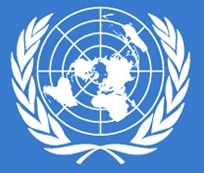Last week I posted that Congressmen Christopher Smith (R-NJ) and Trent Franks (R-AZ) had sided with Egypt and other anti-gay nations to oppose a request to the UN by the Obama administration that the International Gay and Lesbian Human Rights Commission be granted consultative status at the body.
 Smith and Franks did not succeed:
Smith and Franks did not succeed:
On July 19, 2010, the full United Nations Economic and Social Council (ECOSOC) voted in favor of a US-led resolution to grant the International Gay and Lesbian Human Rights Commission (IGLHRC) consultative status. IGLHRC is only the tenth organization working primarily for lesbian, gay, bisexual, and transgender (LGBT) human rights to gain such status at the United Nations.
"Today's decision is an affirmation that the voices of lesbian, gay, bisexual, and transgender people have a place at the United Nations as part of a vital civil society community," said Cary Alan Johnson, IGLHRC Executive Director. "The clear message here is that these voices should not be silenced and that human rights cannot be denied on the basis of sexual orientation or gender identity."
The resolution passed with 23 in favor, 13 against, and 13 abstentions and 5 absences.
This victory is particularly significant, coming as it does after a prolonged 3-year application process in the sub-committee that makes initial recommendations on status. Despite full compliance with all procedures IGLHRC faced deferrals, homophobic questioning, and procedural roadblocks in the ECOSOC NGO Committee.
Today's decision overturned a "no-action" vote in the NGO-committee that threatened to establish a dangerous precedent and the possibility of organizations deemed controversial being continuously denied the opportunity to have their application put to a vote even after undergoing the required review.
Said President Obama in a statement on Monday:
"I welcome this important step forward for human rights, as the International Lesbian and Gay Human Rights Commission (ILGHRC) will take its rightful seat at the table of the United Nations. The UN was founded on the premise that only through mutual respect, diversity, and dialogue can the international community effectively pursue justice and equality. Today, with the more full inclusion of the International Lesbian and Gay Human Rights Commission, the United Nations is closer to the ideals on which it was founded, and to values of inclusion and equality to which the United States is deeply committed."



